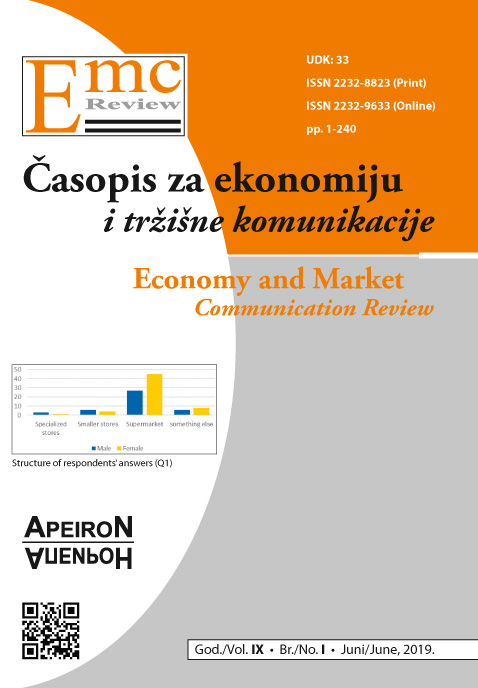IMPACT OF SHARING INFORMATION WITH SUPPLIER AND BUYER ON THE ORGANIZATIONAL PERFORMANCE OF FOOD COMPANIES IN BOSNIA AND HERZEGOVINA
DOI:
https://doi.org/10.7251/EMC1901033PAbstract
In the turbulent environment which is characterized by constant market changes and the development of informational technologies, supply chain is becoming the key instrument for competitive advantage. To survive on the market and be competitive, enterprises have to share and distribute knowledge and information. Information sharing affects the fundamental decisions of the supply chain management. Information sharing with partners is a precondition for the exchange of knowledge needed for business. Most important partners for every enterprise are their suppliers and buyers. Suppliers and buyers are key participants of the supply chain from which they get needed information. Relations with suppliers and buyers are an important precondition for the improvement of the operative performance of the enterprise. Sharing information with suppliers and buyers is done in the following way: information delivered to suppliers, information obtained from the supplier, information delivered to buyers and information obtained from buyers.
To examine the impact of the supply chain used an empirical study about multi-dimensional relations. The research is focused on information sharing by food industry in Bosnia and Herzegovina (BiH). A random systematic sample was used to distribute the questionnaire to these companies. Collected data is analysed using the Confirmatory factor analysis (CFA), and the model was tested using the Structural equations model (SEM). The results showed that information sharing impacts the improvement of the organizational performance of companies, and partnerships with supplier and buyer impact on the information sharing. Results of this study showed that information sharing does not have a significant impact on the sub constructors of operative performances of the enterprise because there is no significant connection with flexibility, while for the other constructors there is a significant connection between information sharing and operative performances of the enterprise. Based on these facts, it examined the importance information sharing in the supply chain for the development of partnerships and improvement of performance this companies.
The results will help managers on food industry in BiH how to improve quality of the information sharing through partnerships and how to developing operative performances companies. The model gives directions for developing business enterprises in food industry using information sharing within the supply chain. Apart from that, obtained results contributed to the better understanding of the significance of the information sharing in the food supply industry enterprises. Based on what is said, to improve the business of the enterprise, it is needed to share quality information which is possible to get through improving cooperation with key participants in the supply chain.
